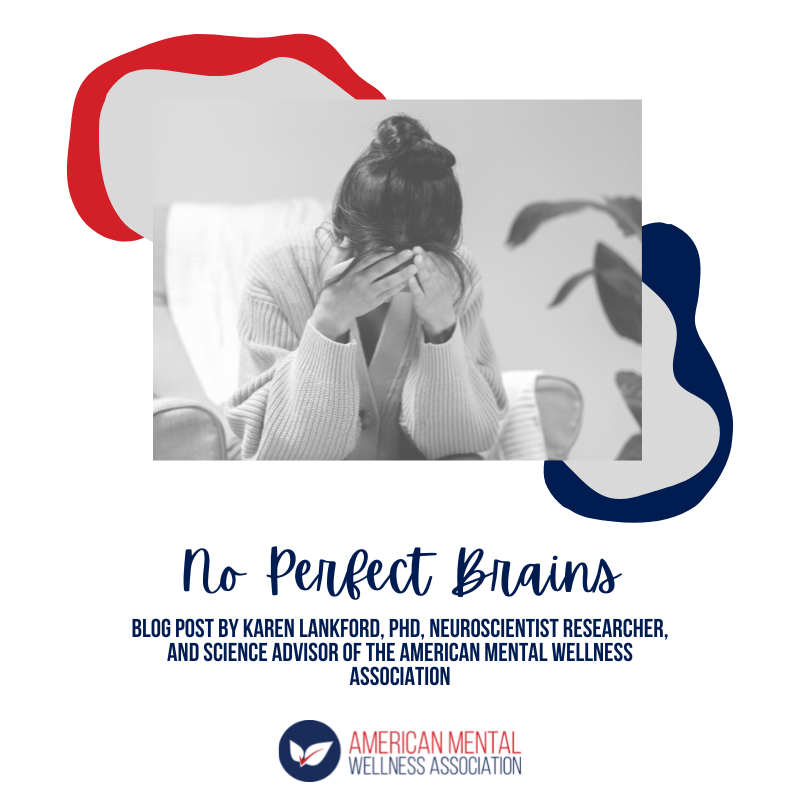No Perfect Brains | Karen Lankford, PhD, Neuroscientist at Yale University
I can say with some degree of confidence that everyone reading this text has something wrong with their brain.
I can be highly confident of this statement because constructing a human brain is such a complex process that some small part of the project almost invariably goes a bit wrong and produces one or more substandard components.
For myself, there are several things that I know of that that are wrong with my brain. I was born prematurely at a time when doctors were just starting to figure out how to keep premature infants alive without also causing them to become blind. As a result, I have flattened corneas and that means that my retinas, which are an out pocketing of my brain, are misshapen. Part of my brain is quite literally warped.
I also had multiple ear infections as an infant, which affected my vestibular system. Combined with the flattened corneas which made me legally blind without corrective lenses, the messed up vestibular signals prevented my brain from properly pruning miss-mapped connection to my visual cortex. As a result, I have a form of dyslexia where I see closely positioned images, such as letters in a word, as simultaneously existing in more than one position. I see the word “the” as the, hte, het, eth, and eht. I have learned to reject all combinations which do not correspond to what the rest of the world sees as normal, but if I mistype a simple word, I cannot see the error.
My balance and hand-eye coordination are also rather poor, as are my special navigation skills
and a lifetime of practice has produced only minimal improvements in these.
I also have a problem with temperature regulation in my feet. When my feet get cold, they sweat and make them even colder, a condition known as paradoxical sweating (which is a condition that I share with my father and hence is likely a genetic flaw in my nervous system).
I have a dysphonia related to high pitched noises, which I experience as painful and maddeningly annoying. The sound of a kitten meowing or a baby crying makes me want to bash its skull in to make it stop. (Don’t worry, I have no children or cats.) This has probably always been a life-long issue as my parents said I almost never cried as an infant, but instead would try and get their attention by clearing my throat.
I am not face blind or autistic, but my skills at facial recognition and identification of emotions based on facial expression are below average. I can tell if two tones are different, but unless they are far apart, I cannot tell which one is higher or lower. I am also so introverted that I fall off the end of the introversion, extroversion scale. I experience intense anxiety when I have to speak in public or need to make certain kinds of stream crossings when I hike. If I were to through the DSM systematically, I would probably also be able to find a half a dozen or more diagnoses that could be applied to me.
The point I have been trying to make here is that having some parts of your brain which do not function well does not mean that there are not a lot of other parts that do work well, and possibly even better than average. I read slowly, but I retain much more of what I read than the average person and my slow reading has not kept me from earning a PhD. My balance is poor, but I hike with poles, and I have developed excellent skills for falling without causing myself serious injury, unlike some of my hiking buddies who have suffered hand fractures trying to catch themselves after tripping on rocks or roots. I carry an extra pair of socks to change into if my feet get cold and sweaty. I do not enjoy social gatherings, but I have close friends and I am happily married to a man who is nearly as introverted as I am and does not mind that I would generally rather read a book than go to a party or have a conversation. My vison problems can be corrected with contact lenses, and now reading glasses as well, and the other problems I have found work arounds for or have learned to live with them.
I am imperfect. My brain is imperfect, but the rest of the world is imperfect in other ways.
Being diagnosed with a serious neurological or neuropsychiatric diagnosis does not mean that you are broken or worthless. It says nothing about how intelligent, or kind, or funny, or brave, or creative, or hard working you are. It says nothing about how much you are loved, or what kind of contribution you can make in the world. There can still be a lot that is right with you, or even better than just all right. You may have talents that you have not yet discovered. Not every problem that you have may be fixable, or even needs to be fixed. Your flaws do not define you. What defines you is what you choose to do with the hand fate has dealt you.

